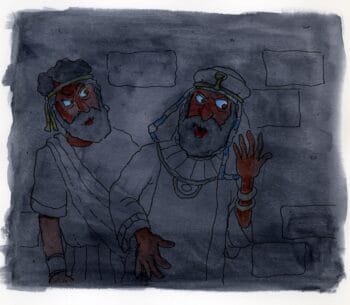Daily Lesson for Sunday 27th of July 2025
The prophet Amos declares that “ ‘the Lord God does nothing without revealing his secret to his servants the prophets’ ” (Amos 3:7, ESV), and through the prophet Moses, He revealed to Pharaoh what was coming next. The most solemn warning was given to Pharaoh. This will be a just judgment upon pride, exploitation, violence, and idolatry, all of which have triggered these calamities upon Egypt.
Read Exodus 11:1-10. What warning did God give before executing judgment upon Egypt?
God gave Egypt time—three days of darkness (Exodus 10:22-23)—to think about recent events and what they meant. He also provided their last explicit warning, the last chance to do the right thing.
But Exodus 11:8 says that Moses “went out from Pharaoh in great anger” (NKJV). Why would Moses leave in anger? Most likely because he knows the tragedy, the tenth plague, is going to hit a lot of innocent people—all because of Pharaoh’s hardness of heart.
Also, the number ten is significant in biblical symbolism. Ten represents fullness or completeness. (Think of the Ten Commandments as a complete revelation of the divine moral law.) The ten Egyptian plagues point to God’s full expression of His justice and retribution.
God is the Judge, and He is against pride, injustice, discrimination, arrogance, exploitation, cruelty, and selfishness. He is on the side of the sufferers, the abused, the mistreated, and the persecuted. God will execute justice, which truly is another expression of His love. (See Psalms 2:12, Psalms 33:5, Psalms 85:11, Psalms 89:14, Psalms 101:1, Isaiah 16:5, Jeremiah 9:24.)
We too should try the best we can to be both loving and just. However, we can easily fall into extremes, one way or another. Out of “love” we turn a blind eye to wrongs, to things that need to be corrected. Or we can coldly execute justice as if it were something made of steel. Neither extreme is correct. Instead, this is the ideal: “And what does the Lord require of you but to do justly, to love mercy, and to walk humbly with your God?” (Micah 6:8, NKJV).
|
If we can’t get the perfect balance (which we can’t), why is it better to err on the side of mercy instead of justice? Or is it? |
 (0)
(0)



